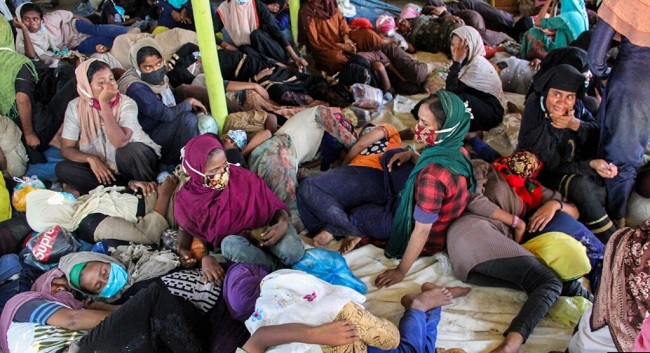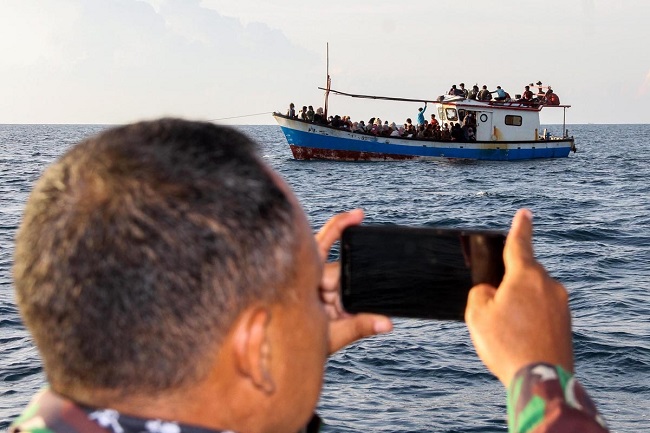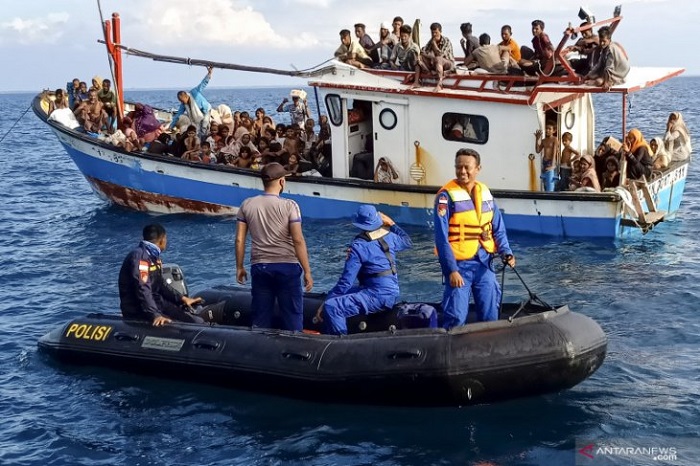The criminalisation of people smuggling has created complex moral and legal difficulties for those who assist refugees in peril
In June 2021, the Lhoksukon district court announced an unexpected judgment in a criminal case against three Acehnese fishermen who had rescued 99 people from a sinking vessel in international waters about 105 miles from Aceh. Three fishermen – Faisal Afrizal, Abdul Aziz and Afrijal – were sentenced to five years imprisonment for having disembarked 99 Rohingya so-called ‘boat people’ in the Andaman Sea in June 2020.
The same day, the news went viral on many online news portals and social media. Politicians and civilians considered the punishment for the fishermen especially unfair. The high-profile national politician, Fadli Zon, criticised the judgment on his Twitter account saying ‘These three Acehnese fishermen who saved the Rohingya people should be rewarded for applying the Pancasila's principles of humanity and social justice. Why were they punished?
3 Nelayan Aceh ini menyelamatkan warga Rohingya harusnya diberi penghargaan krn melaksanakan amanat Pancasila, kemanusiaan yang adil dan beradab. Kok malah dihukum.
— FADLI ZON (Youtube: Fadli Zon Official) (@fadlizon) June 17, 2021
3 Nelayan Aceh Utara yang Tolong Warga Rohingya di Tengah Laut Dihukum 5 Tahun Penjarahttps://t.co/YAZOuI10W8
The case in question has two sides that are often hard to distinguish – on the one hand, saving people from drowning at sea, on the other, helping people to illegally enter Indonesia. In many cases it is extremely hard to identify the different actors and unpick the various motives involved.
A closer look at how Indonesian judges dealt with similar cases to this one, in which the defendants were charged with people smuggling crimes which occurred in the process of rescuing refugees at sea, reveals grave inconsistencies in the justice process.
Previous smuggling cases
In 2011, people smuggling became a special criminal offence under the Law on Immigration (Law No. 6/2011, Article 120). Under this law conducting people smuggling is punishable with a minimum of five years and a maximum of 15 years imprisonment, as well as a fine of up to 15 billion rupiah (A$1.5 million). This law also provides two other offences, which involve more lenient sanctions, against which people-smuggling perpetrators can be charged – being a person-in-charge of the conveyance transporting people outside an immigration checkpoint (Article 114 (2)) and assisting irregular migrants (Article 124).
Before the Law on Immigration was enacted, hundreds of Indonesians, mostly fishermen, had already been punished outside Indonesia in Australian courts for people-smuggling offenses, such as transporting asylum seekers and refugees to Australia. Up until 2011 only a few smuggling cases were resolved in Indonesian courts, and with relatively light sentences, under the general immigration criminal clause of Immigration Law No. 9/1992.
Since 2011, more than one hundred smuggling cases have been decided in Indonesian courts. First and foremost, the defendants were people who assisted refugees to leave Indonesia and reach Australia where they hoped to register their asylum claims. The defendants were generally people with low economic status, mostly fishermen, who were used by smuggling organisers as field operators. Such people play a minor role in the network and can easily be replaced by another poor person.
The push factor
Rohingya refugees have been coming to Aceh by boat for more than a decade. The province is widely known as a popular entry point to Indonesian for these refugees, especially since the 2015 Andaman Sea refugee crisis when 7000–8000 Rohingya refugees were stranded at sea. At that time, 1800 were rescued by Acehnese fishermen. This influx was closely related to the exodus of the Rohingya, a Muslim ethnic minority, from Myanmar where they have faced persecution since the 1960s. Currently, about 1.2 million Rohingya live outside their country of birth. About 80 per cent are hosted in Bangladesh and it is estimated that at least 800 Rohingya are in Indonesia.

In December 2021, 105 Rohingya refugees, mostly children and women, arrived in Aceh after their boat broke down in the middle of the sea. More recently, in March 2022, another boat carrying 114 Rohingya arrived in Aceh, signalling that this kind of movement is unlikely to stop in the future given the unrelenting military-led conflict in Myanmar and severe overcrowding in camps in Bangladesh.
The majority of Rohingya who arrive in Aceh actually intended to go to Malaysia, which hosts a large diaspora of around 120,000 Rohingya. Many have been living there since the 1970s, working as cheap laborers without legal standing. A shift in attitudes towards Rohingya refugees within Malaysia in recent times has prevented many ‘boat people’ from reaching that country and instead they have looked further afield to Indonesia.
Criminal investigations
The criminal conviction of Faisal Afrizal and friends is the first smuggling case involving ‘rescuers’ to be brought to court. Previously, saving asylum seekers who entered Acehnese waters, particularly the Rohingya, was always categorised as a humanitarian response and an expression of Acehnese hospitality. Apart from being a universally applicable moral duty, saving people at sea and elsewhere is also an obligation of Acehnese fishermen under the customary law of the sea (hukum adat laot). This law was established by a decentralised traditional institution called Panglima Laot (literally ‘commander of the sea’) and has been in operation since the 17th century. Its purpose, among other things, is to protect the marine environment, resolve disputes among fishermen and help troubled boats at sea. While these values are deemed very important in Aceh, the criminal investigations against the three Acehnese fishermen revealed that the fishermen had not encountered these boat people coincidentally, but rather that they had been instructed to do so.
Fishermen in Acheh become “fisher of men” by rescuing refugees. Terima kasih! Now to move to durable solutions for refugees everywhere. https://t.co/LlHKjJQ6fE
— Dr Khor SK (@DrKhorSK) June 26, 2020
/ At the time, the rescue was met with widespread international praise and gratitude
During the trial at the Lhoksukon District Court, one of the defendants, Faisal Afrizal, stated that three men, Adi Jawa, Anwar and Shadad Deen, ordered him to pick up Rohingya refugees in the Andaman Sea and transport them to Kuala Idi Rayek, East Aceh. Anwar and Shadad Deen are themselves Rohingya refugees who married Indonesian women and were living in Aceh and Medan, respectively. While Shahad Deen was also tried and eventually received the same punishment as the fishermen, Adi Jawa and Anwar are still wanted by the police.
Faisal Afrizal testified that he was initially asked to pick up only 36 Rohingya but when he finally came across the refugees’ boat the number on board was far in excess of that. Faisal Afrizal explained that he felt compassion for the refugees after seeing how bad their conditions were, especially as the majority were children and women. After initial doubts he decided to allow all of the 99 Rohingya to board his vessel. Then on the way to shore his boat suffered engine damage and had to be towed by another fishing boat the final few kilometres. In his defence he argued that, rather than a people-smuggling case, this was a case of rescue on humanitarian grounds.
In their final verdict the judges saw the humanitarian motive only as a mitigating factor, focusing more on proving the prosecutor’s demands on three requirements based on Article 120 – namely that the defendants acted with the intention to: one, obtain direct or indirect profit for themselves or for another person; two, transport people into or out of the Indonesian territory or to the territory of another country, or ordered others to do so; and three, these people do not have permission to enter or leave one of these territories.
The judges argued that the defendants were proven to have carried out this action for profit. The fact that they each only received between Rp 2.5 and 7.5 million (A$250–750) instead of the previously agreed amount, while still having to cover their ship’s operational cost of Rp 5.5 million (A$550), was not taken into account. The court ignored the fact that although the fishermen were instructed to pick up some refugees at sea, their motives changed to rescue and saving people from drowning.
Formalism and its consequences for ‘rescue at sea’
Since 2006, Indonesia’s Attorney General’s Office has considered people-smuggling cases to be high priority cases. The Attorney General’s Office maintains strict oversight of its public prosecutors’ handling of cases, which are always deemed a priority to bring to court. Prior to this such cases were regulated only as a specific criminal offence under the Immigration Law.
The entry of refugees into Indonesia, especially the Rohingya, continues to this day and it seems clear that punishing the rescuers on the pretext of people smuggling will also continue. Authorities are intent on pursuing criminal investigations where they can and proceeding to prosecution on the assumption that the sentence will have a deterrent effect and ultimately stop the flow of refugees to Indonesia. When cases involving refugees come before the court, formalist legal approaches tend to dominate the Indonesian judicial system while local views on justice, such as the value of humanity and solidarity in the Aceh case, tend to be ignored.

When Afrizal’s case was appealed in the High Court in Banda Aceh, the decision was upheld on the basis that the local court’s decision fulfilled a sense of justice and, more importantly, provided a deterrent. Through their lawyers the fishermen submitted a cassation to the Supreme Court to review this case – the last resort in the Indonesian criminal justice system – which was again rejected. The decision shows that even the Supreme Court endorses a formalist approach, shying away from considering the humanitarian motive behind cases such as this.
This recent case from Aceh gives rise to fears that in the future it is very likely that inconsistencies and confusion will mar further court judgments involving the rescue of maritime refugees, especially the difficulty in distinguishing between incidents involving rescue in an emergency and ‘real’ people-smuggling cases. As a consequence, it is very possible that fishermen and other boats will avoid their moral duty to rescue refugees at sea for fear of legal repercussions.
Criminalising rescuers will most likely not serve as a deterrent to future influxes of Rohingya refugees to Aceh. One can already imagine the humanitarian disaster that would occur if boats in distress carrying refugees are ignored because fishermen are afraid of being punished for coming to their aid. It is clear that all of this will weaken refugee protection in Indonesia; however, it is not clear that it will prevent refugees from coming to Indonesia in the future.
Bilal Dewansyah (b.dewansyah@law.leidenuniv.nl) is a PhD candidate at the Van Vollenhoven Institute (VVI), Leiden Law School, Netherlands, and a lecturer (on study leave) at Constitutional Law Department, Universitas Padjadjaran’s Law Faculty, Indonesia.












